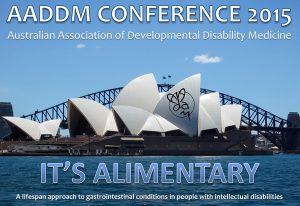 AADDM Conference 2015 – Thursday, August 13, 2015
AADDM Conference 2015 – Thursday, August 13, 2015
IT’S ALIMENTARY – A lifespan approach to gastrointestinal conditions in people with intellectual disabilities
Venue: John Beveridge Lecture Theatre, Level 1, Sydney Children’s Hospital, Randwick
The 2015 Australasian Association for Developmental Disability Medicine (AADDM) Conference will be held over one day at the John Beveridge Lecture Theatre, Level 1, Sydney Children’s Hospital, Randwick NSW 2031 on Thursday 13th August 2015.
Conference themes focus on Gastrointestinal Issues across the ages in people with Intellectual Disability
- Dysphagia, Nutrition and Enteral feeding
- Upper and lower gastrointestinal disorders
- Obesity – epidemiology, behavioural and surgical approaches
On Friday 14th August 2015, will be a half day Post Conference Workshop – “Looking after the Waistline: Positive Cardiometabolic Health in People with an Intellectual Disability” hosted by Professor Julian Trollor.
Time: 9:30am – 12:30pm
Venue: Black Dog Institute, Hospital Road, Prince of Wales Hospital, Randwick NSW 2031
This half day, interactive workshop will assist health professionals to better identify and manage cardiovascular and metabolic risk factors in people with an intellectual disability across the lifespan. Participants will develop and enhance their understanding of:
- Cardiometabolic risk factors in people with an intellectual disability, and their contribution to morbidity and mortality.
- Barriers to effective monitoring and management of cardiometabolic risk factors in people with an intellectual disability.
- The relationship between psychotropic prescribing practices and cardiometabolic risk factors.
- The international initiatives to reduce the morbidity and mortality associated with mental illness.
- Targets for positive cardiometabolic health in people with an intellectual disability, including the latest recommendations for physical activity and exercise to manage cardiometabolic risks.
- Key tools available to assist health professionals in the management of cardiometabolic risk factors.
Suitable for: Health professionals from all backgrounds including general practitioners, paediatricians, physicians, and psychiatrists.
